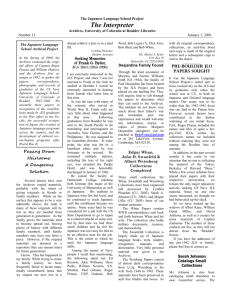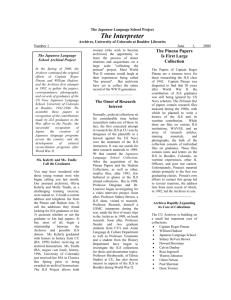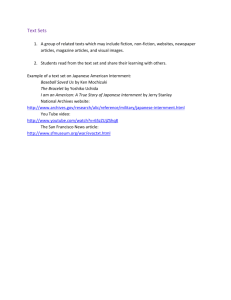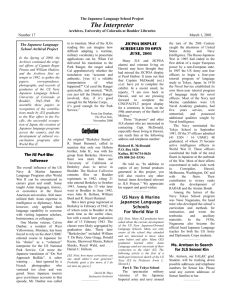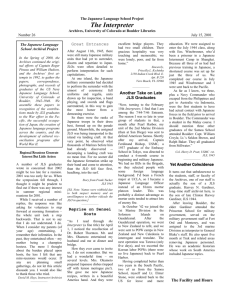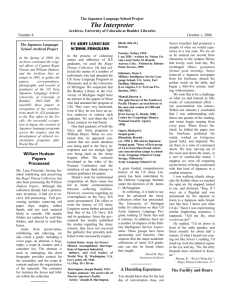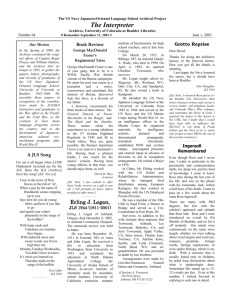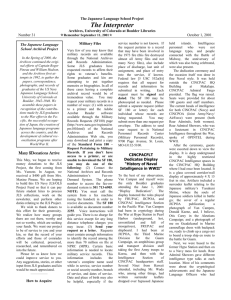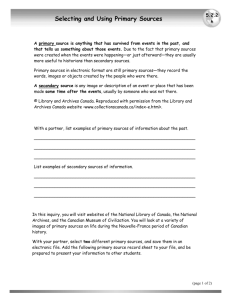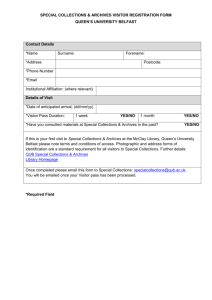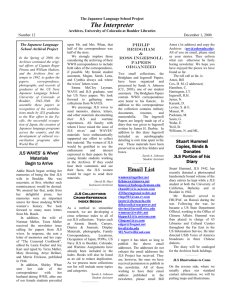The Interpreter - University Libraries
advertisement
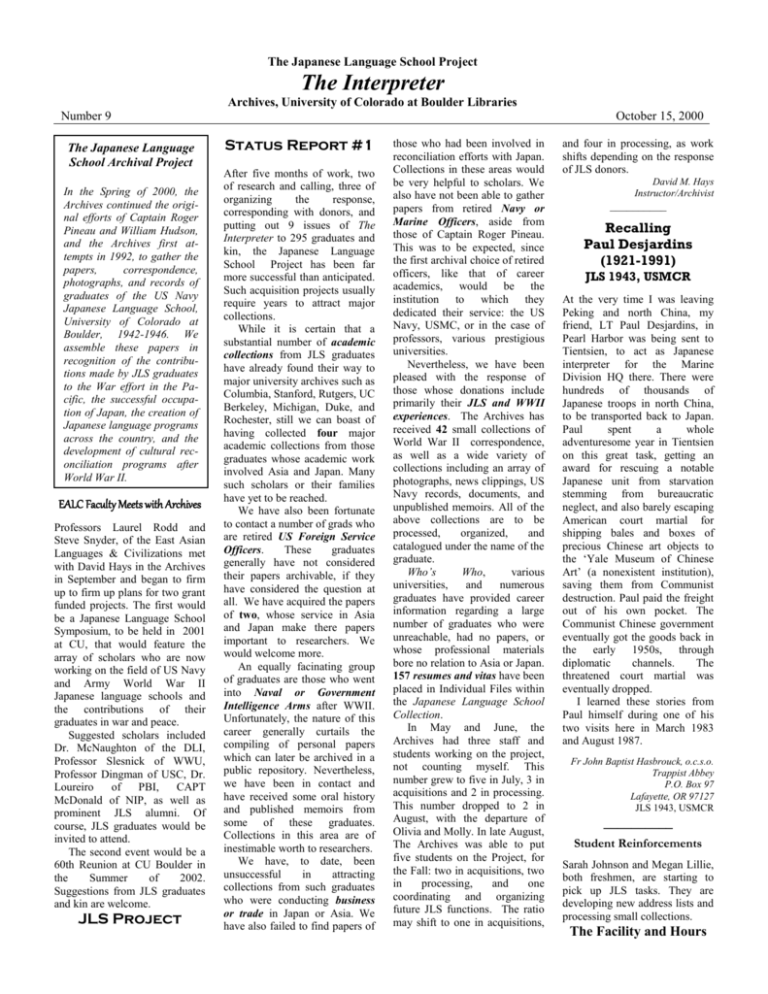
The Japanese Language School Project The Interpreter Archives, University of Colorado at Boulder Libraries Number 9 The Japanese Language School Archival Project In the Spring of 2000, the Archives continued the original efforts of Captain Roger Pineau and William Hudson, and the Archives first attempts in 1992, to gather the papers, correspondence, photographs, and records of graduates of the US Navy Japanese Language School, University of Colorado at Boulder, 1942-1946. We assemble these papers in recognition of the contributions made by JLS graduates to the War effort in the Pacific, the successful occupation of Japan, the creation of Japanese language programs across the country, and the development of cultural reconciliation programs after World War II. EALC Faculty Meets with Archives Professors Laurel Rodd and Steve Snyder, of the East Asian Languages & Civilizations met with David Hays in the Archives in September and began to firm up to firm up plans for two grant funded projects. The first would be a Japanese Language School Symposium, to be held in 2001 at CU, that would feature the array of scholars who are now working on the field of US Navy and Army World War II Japanese language schools and the contributions of their graduates in war and peace. Suggested scholars included Dr. McNaughton of the DLI, Professor Slesnick of WWU, Professor Dingman of USC, Dr. Loureiro of PBI, CAPT McDonald of NIP, as well as prominent JLS alumni. Of course, JLS graduates would be invited to attend. The second event would be a 60th Reunion at CU Boulder in the Summer of 2002. Suggestions from JLS graduates and kin are welcome. JLS Project October 15, 2000 Status Report #1 After five months of work, two of research and calling, three of organizing the response, corresponding with donors, and putting out 9 issues of The Interpreter to 295 graduates and kin, the Japanese Language School Project has been far more successful than anticipated. Such acquisition projects usually require years to attract major collections. While it is certain that a substantial number of academic collections from JLS graduates have already found their way to major university archives such as Columbia, Stanford, Rutgers, UC Berkeley, Michigan, Duke, and Rochester, still we can boast of having collected four major academic collections from those graduates whose academic work involved Asia and Japan. Many such scholars or their families have yet to be reached. We have also been fortunate to contact a number of grads who are retired US Foreign Service Officers. These graduates generally have not considered their papers archivable, if they have considered the question at all. We have acquired the papers of two, whose service in Asia and Japan make there papers important to researchers. We would welcome more. An equally facinating group of graduates are those who went into Naval or Government Intelligence Arms after WWII. Unfortunately, the nature of this career generally curtails the compiling of personal papers which can later be archived in a public repository. Nevertheless, we have been in contact and have received some oral history and published memoirs from some of these graduates. Collections in this area are of inestimable worth to researchers. We have, to date, been unsuccessful in attracting collections from such graduates who were conducting business or trade in Japan or Asia. We have also failed to find papers of those who had been involved in reconciliation efforts with Japan. Collections in these areas would be very helpful to scholars. We also have not been able to gather papers from retired Navy or Marine Officers, aside from those of Captain Roger Pineau. This was to be expected, since the first archival choice of retired officers, like that of career academics, would be the institution to which they dedicated their service: the US Navy, USMC, or in the case of professors, various prestigious universities. Nevertheless, we have been pleased with the response of those whose donations include primarily their JLS and WWII experiences. The Archives has received 42 small collections of World War II correspondence, as well as a wide variety of collections including an array of photographs, news clippings, US Navy records, documents, and unpublished memoirs. All of the above collections are to be processed, organized, and catalogued under the name of the graduate. Who’s Who, various universities, and numerous graduates have provided career information regarding a large number of graduates who were unreachable, had no papers, or whose professional materials bore no relation to Asia or Japan. 157 resumes and vitas have been placed in Individual Files within the Japanese Language School Collection. In May and June, the Archives had three staff and students working on the project, not counting myself. This number grew to five in July, 3 in acquisitions and 2 in processing. This number dropped to 2 in August, with the departure of Olivia and Molly. In late August, The Archives was able to put five students on the Project, for the Fall: two in acquisitions, two in processing, and one coordinating and organizing future JLS functions. The ratio may shift to one in acquisitions, and four in processing, as work shifts depending on the response of JLS donors. David M. Hays Instructor/Archivist __________ Recalling Paul Desjardins (1921-1991) JLS 1943, USMCR At the very time I was leaving Peking and north China, my friend, LT Paul Desjardins, in Pearl Harbor was being sent to Tientsien, to act as Japanese interpreter for the Marine Division HQ there. There were hundreds of thousands of Japanese troops in north China, to be transported back to Japan. Paul spent a whole adventuresome year in Tientsien on this great task, getting an award for rescuing a notable Japanese unit from starvation stemming from bureaucratic neglect, and also barely escaping American court martial for shipping bales and boxes of precious Chinese art objects to the ‘Yale Museum of Chinese Art’ (a nonexistent institution), saving them from Communist destruction. Paul paid the freight out of his own pocket. The Communist Chinese government eventually got the goods back in the early 1950s, through diplomatic channels. The threatened court martial was eventually dropped. I learned these stories from Paul himself during one of his two visits here in March 1983 and August 1987. Fr John Baptist Hasbrouck, o.c.s.o. Trappist Abbey P.O. Box 97 Lafayette, OR 97127 JLS 1943, USMCR __________ Student Reinforcements Sarah Johnson and Megan Lillie, both freshmen, are starting to pick up JLS tasks. They are developing new address lists and processing small collections. The Facility and Hours Archives is located in the basement of Norlin Library at the east end of the historic quadrangle on the Boulder campus of the University of Colorado. The Archives is open MWF, 1100-1700, but is staffed from 0800-1700, M-F. Out of town researchers may arrange for early and every day entry. Photocopying and both photographic and audiovisual reproduction services are available. To Donate If you wish to donate your materials, please contact the Archives to insure the proper mailing address. For large shipments, the archives will reimburse expenses. Upon receipt of materials we will send the donator a deed of gift with instructions. The donator must return to the Archives signed deeds of gift. The Archives will then provide copies of preliminary inventories and guides to donors and donor families when available. Feel free to contact us at any time. Contact Bruce Montgomery, Curator, or David Hays, Archivist, Archives, University of Colorado at Boulder Campus Box 184 Boulder, Colorado, 80309-0184 Phone (303) 492-7242 Fax (303) 492-3960 Email: montgomb@spot.colorado.edu arv@colorado.edu Website: www-libraries.colorado.edu/ps/arv/ frontpage.htm New Collections Sought The Japanese Language School Project seeks original World War II correspondence, photographs, scrapbooks, diaries, journals, and records, as well as the complete professional and personal papers of those JLS graduates who went into Asia and Japan related careers: in the Foreign Service, in intelligence, in academia, in business, in missionary work, and in any sort of US/Japan exchange or reconciliation effort or organization. Graduates who have nothing else can send a resume or vita.
